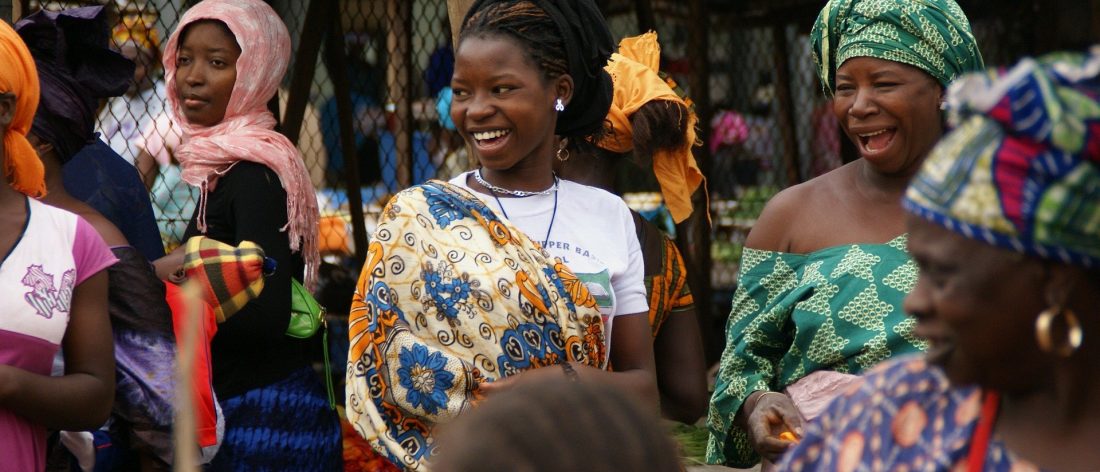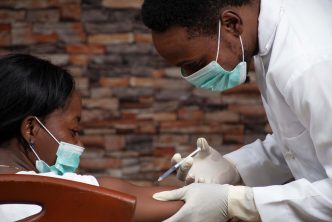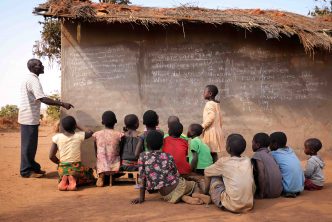How can Nigeria cater to the poor as the government begins to shut down its cities to flatten the Covid-19 infection curve?
It is 7:00 a.m. on the eve of the proposed shutdown of Abuja, Nigeria’s capital city, in response to the COVID-19 epidemic. Today, I chose to work from my daughter’s room instead of my study because she gets the best view of the hills in the horizon and the flowers in the backyard. But she also has a view of a residential estate that is under construction. The site is already abuzz with workers. The “mama-put” is set up and is already serving meals. This sight got me thinking of the fate of Nigeria’s poor during the proposed shutdown. How many will succumb to hunger (during this shutdown) even before the virus completes its rounds?
Nigeria is a desperately poor country with about 48 percent of her population (or 96 million) living in extreme poverty. The poverty benchmark income of $1.90 (or N700) per day supports not just an individual but, typically, a family. That doesn’t buy a lot. Bill Gates chronicles some of their experiences in his blog, Gates Notes.
Add unemployment to the morass. There are a few challenges worse than waking up in the morning with no place to go. This is the reality of about 3 out of 10 Nigerians who are willing and ready to work but can’t find a job. As bad as that sounds, it does not include the under-employed or those in disguised unemployment. Anecdotal evidence indicates that most Nigerians are 2 to 3 pay checks away from destitution.
Nigeria’s economy may not be in a position to resolve the above challenges. The government’s plan to spend N8.15 trillion in 2020 is now significantly challenged. The revenue calculations anticipated that a barrel of oil would sell for $57; it is currently around $25. The government hoped to sell 2.18 million barrels of crude oil per day when the country has produced only an average of 1.7 million bpd for the last few years. Even the best-case scenario still anticipated that Nigeria will borrow about N1.6 trillion to meet its revenue shortfall. Sadly, there are not a lot of people eager to write a cheque to Nigeria.
The Covid-19 pandemic has worsened Nigeria’s precarious situation. The United Nations Development Programme estimates that about half of all the jobs in Africa will be lost to the pandemic. For Nigeria, it is going to be a double-whammy as oil prices continue to decline and the country will be forced to devalue its currency. Nigeria may not get any significant upside from the devaluation as the country does not produce much of what it consumes. Nigeria’s GDP growth can be expected to significantly decline from the already low estimates of 2.1 percent.
The weight of these realities was obvious as President Buhari announced the shutdown of two states (Lagos and Ogun) and the Federal Capital Territory (Abuja) in response to the Covid-19 pandemic. He must have realised that the shutdown is almost a death sentence for many of Nigeria’s daily wage workers including some of the ones I can see on the construction site behind my house. It is unlikely that they have much financial savings or that they can stockpile any food. It is no different for the women in the villages who have to sell, say, peppers from their farms to buy rice? What happens when the village market is shut down? What is the fate of the millions of Nigerians who have been trying to stretch their N700 even before the advent of Covid-19? The government can’t just shut down the cities and walk away.
The logical option is for the government to provide some relief or essential commodities to these vulnerable populations. While this makes sense, there are a number of inherent implementation challenges. For instance, can a government that can’t fund its budget unlock sufficient funds for such a programme? Without data, how would the government identify the right beneficiaries? What systems and processes should be put in place to prevent elite capture or abuse of the programme?
The organised private sector and many well-meaning Nigerians can help address the financial challenges. This group has shown a strong willingness to contribute resources to support the government’s response to the Covid-19 pandemic. For instance, Nigeria Economic Summit Group recently appointed Segun Ogunsanya, Chief Executive Officer at Airtel, to coordinate private sector donations. Segun is a capable and well-respected professional and there is little doubt that he can raise the support. More importantly, he is the head of a big franchise that he can’t afford to taint with any allegations of graft or abuse. This should give the rest of the private sector the confidence to step in and help plug the government’s resource gaps.
While it is true that the circulation of the national identity card is not universal enough for it to be relied upon at this time, there are other means of identifying the poor and vulnerable in our midst. For instance, the government can use data on mobile phone usage to identify the poor and needy. The beneficiaries, who are so identified, can receive vouchers that entitle them to food items. The government can obtain assistance from various consulting firms to help create a logistics or supply chain to get the food items close enough to the beneficiaries.
The use of technology to create and deliver this solution should leave a transactions trail that can be audited. Such audit should minimise abuse especially if the audit firm is appropriately incentivised to seek out such evidence of abuse. It is imperative to ensure that such incentives do not create unintended consequences that may impact programme effectiveness.
Nigeria has some experience or history with a similar programme. As Nigeria’s Minister of Agriculture, Dr. Akinwunmi Adesina (current President of the Africa Development Bank), implemented a programme that used mobile phones to deliver fertilizer vouchers to farmers thereby cutting out the middlemen and breaking up the fertiliser cartel in Nigeria. A variant of his programme can be quickly developed and implemented to enable the government to deploy a palliative programme that caters to the needs of the poor and vulnerable. Nigeria’s poor need the help especially in this time of the Covid-19 pandemic.
Shutting down Nigeria without properly providing for the vulnerable is, at best, another erroneous elitist programme, and at worst, insensitive. Such unplanned shutdown could lead to more deaths from hunger than from the Covid-19 pandemic. The desire of the construction workers behind my house is to make a decent living to take care of their responsibilities. If their concerns are not properly considered, a well-intended social distancing programme could inadvertently trigger social dissension that could easily spiral out of control. It is terrible to be poor, and especially in a world shaped by the Covid-19 pandemic but the government still has a few cards it can play to alleviate the challenges of the vulnerable.







